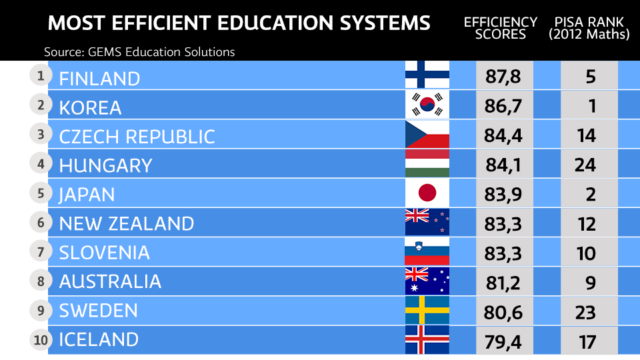Finland is known for its phenomenon-based approach to education which it introduced in its curriculum reform in 2016 with the aim of transforming and not just educating. With the motto of establishing a collaborative approach, this type of learning aimed at involving students in their studies by working in groups. Now the bigger question is what is phenomenon-based learning? This type of learning comes with the benefit of approaching a subject, not like a subject at all. Students are taught a phenomenon through different approaches. It could be mathematically, scientifically, politically, and so on. Students learn to work in groups which promote team-work, encourage efficiency in communication and to solve problems in a constructive manner. They talk about technology, global warming, sustainability, development, etc. in a manner that prepares them for life and not just for exams.

Think about a school where one wouldn’t have to run in the rat race; a school where homework means interesting projects and not mugging up the syllabus; a school that does not restrict its syllabus with particular subjects but teaches everything; a school that focuses on problem-solving and is dedicated to a practical approach. The question is, will this work in India? More importantly, is our country ready to accept such changes and if yes, what would it require to bring such a transformation?
Experts believe, this is not a day’s work but requires a systematic change. It is a process. It needs to sink in. It needs to evolve. That is what any major transformation would require if the desired effect is a long-term one. Given the structure of our education system, what needs to be fixed first is the mindset of people. Teachers, students, and parents need to get used to the idea because it must be a collaborative fixing. Before things don’t pan out as envisioned and ideas fail, it is necessary for our policymakers to concentrate more on the loopholes that follow with such revolutionary changes.
Looking on the brighter side, some amazing facts about Finland’s education system could stand as a great example for our country. Children in Finland do not start schooling before the age of seven. ‘Charity begins at home’ – seems the Finnish strictly follow this. For the initial few years, there is no grading system for students. There is no concept of a topper or a failure in their schools. The interesting part is, students are asked to leave their shoes open before entering their school premises. Also, they are asked to address their teachers by their first names. These are done to ensure that pupils can feel relaxed in school and are mentally unburdened while learning. And yet discipline remains their core principle. The schools in Finland are independent of political pressure and a great amount of trust is placed on the principals as they run schools. They have a free and compulsory education system for all. Charging fee is illegal in Finland. This is so much in contrast to how even pre-schooling policy is rigid in our country. Students enjoy the liberty to build their career around their interests which is highly supported by the Finnish schools through capacity-building, frequent counseling, etc. Most importantly, teaching is a much-respected profession in Finland, and rank no less than medical or engineering. They’re highly paid and teachers require being at least Master degree holders for being eligible in the profession.
For such kind of system to work in India, teaching quality needs to be regulated. To impact lives, teachers must first refine the ability to research deeply, learn, and embrace innovation. In contrast to a system where students are evaluated on the basis of their memory and recall power, Finland’s education model definitely is a rebellion, but a worthy one.


























